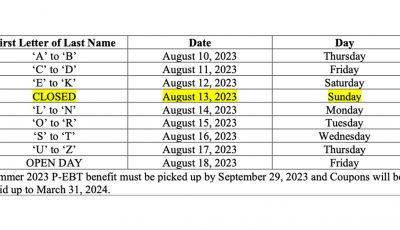DCCA secretary: The truth about food stamps
In recent media reports, Delegate Gregorio Kilili C. Sablan (Ind-MP) stated that he had food stamp funding increased first by 13.6 percent, then by another $1 million this year. Sablan says that he doesn’t consider it “welfare” because he knows that it is basic human decency to help feed the hungry.
These recent statements by Sablan have infuriated CNMI agencies charged with the administration of food stamp benefits: the Department of Community and Cultural Affairs and the CNMI NAP Office.
“I find this statement ironic coming from someone that Wake Up America Movement referred to as the ’hungriest man in the House,’” said DCCA Secretary Melvin Faisao.
The WUAM reports states that Sablan is “the Democratic House delegate for the Northern Mariana Islands (which didn’t even have a delegate until after the 2008 elections), who spent more on food than any other legislator. In fact, Sablan spent $6,000 more than the second-place legislator, Texas Republican Michael Burgess, who spent $17,515.”
Faisao also points out that Sablan claims that he supports the Public School System, and at the same time, the implementation of the Supplemental Nutrition Assistance Program in the CNMI. The odd pairing of advocacy for public schools and an expanded dependency on food stamps is something that Faisao says is an insult to CNMI students.
“I strongly believe that our children are much more valuable than our delegate thinks they are. Our children want to strive hard in school and grow to be productive members of our society and our workforce. They don’t want to simply be dependent on welfare handouts,” added Faisao.
The DCCA secretary also lashed at Sablan for fielding false claims that federal grants come to the CNMI because of his work in Congress. The CNMI USDA block grant is negotiated through a memorandum of understanding by the CNMI state government and the USDA FNS/Western Regional Office. Under the current NAP system, the CNMI distributes nutritional assistance to qualifying members of the community in the form of coupons. The CNMI NAP system exists pursuant to the authority granted to the Secretary under 48 USC Section 1469d(c), which provides in part, “[t]he Secretary of Agriculture is authorized to extend, in his discretion, programs administered by the Department of Agriculture to the Northern Mariana Islands”
Under this authority, the U.S. Department of Agriculture and the CNMI Department of Community and Cultural Affairs execute a memorandum of understanding each year governing the operation of the NAP. The program is federally funded by the USDA’s food stamp budget.
Although similar in its purpose and in many of its features, the NAP is not part of the Food Stamp Program or the now commonly referred to as SNAP. Unlike the SNAP (Food Stamp Program), the NAP is funded by a capped block grant rather than a mandatory appropriation. Thus, applicants for NAP benefits who satisfy eligibility criteria can have their benefits denied or reduced once payments under the program reach the capped amount of the federal grant.
Even the USDA FNS Western Region Office Administrator informed the CNMI that implementing SNAP requires a thorough review of its advantages and disadvantages. In a previous letter to DCCA, the WRO Administrator stated, “The benefits of bringing SNAP to CNMI are many. Nevertheless, it is important to weigh both the benefits and costs of such a transition.”
Cognizant of the CNMI’s challenges, Faisao lamented that the NAP was purposefully designed to differ from SNAP in order to meet the unique needs of the people of the CNMI. Alternatively, SNAP adheres to a baseline of national eligibility and benefit standards.
“If we were to move forward with this conversation, besides data collection and analysis, an important factor to discuss is that [the] CNMI would no longer enjoy the flexibility afforded by the block grant pertaining to eligibility requirements, benefit amounts, and similar policy decisions,” said Faisao. “SNAP regulations would require that CNMI discontinue its “Local Share” requirement, the ability to purchase non-food items with benefits, and taxation of foods purchased with SNAP benefits.”
The CNMI would also be eligible for bonuses for excellent performance and subject to fiscal penalties for sub-par performance under SNAP. Therefore, Faisao says that what we need “is a member of Congress who will push for a welfare assistance program that will provide a mechanism to transition these families from temporary public assistance to becoming a self-sufficient and contributing member of our CNMI workforce.”
Faisao also urged leaders to look into whether SNAP would be an economic advantage to the fisherman and farmers of the CNMI. (Office of the Governor)



























